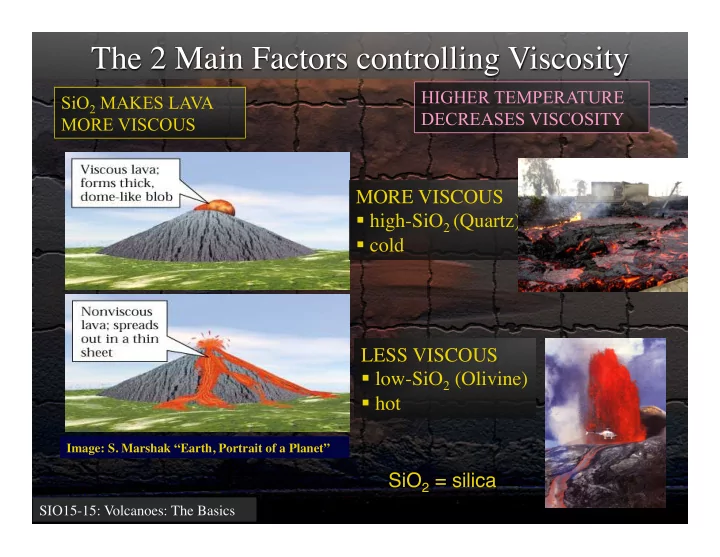

HIGHER TEMPERATURE SiO 2 MAKES LAVA DECREASES VISCOSITY MORE VISCOUS MORE VISCOUS � high-SiO 2 (Quartz) � cold LESS VISCOUS � low-SiO 2 (Olivine) � hot Image: S. Marshak “Earth, Portrait of a Planet” SiO 2 = silica SIO15-15: Volcanoes: The Basics
� crustal thickness � composition (SiO 2 content) CONTINENTAL CRUST HAS MORE SiO 2 THAN OCEANIC CRUST SiO 2 : silica SIO15-15: Volcanoes: The Basics
OCEANIC CRUST • thin • dense, dark rock CONTINENTAL CRUST • thick • less dense, light rock Image: S. Marshak “Earth, Portrait of a Planet” SIO15-15: Volcanoes: The Basics
density Volcanic/Plutonic 2 O i S Rock light color 2.5 g/cm 3 70% silicic (or felsic or rhyolitic) 65-70% Rhyolite/Granite 55-65% intermediate (or andesitic) Andesite/Diorite mafic 40- 55%; rich in Mg, Fe Basalt/Gabbro 3.4 g/cm 3 dark color 40% SIO15-15: Volcanoes: The Basics
Granite: plutonic (coarse grained) Basalt: volcanic (fine-grained) silicic (light-colored) mafic (dark-colored) SIO15-15: Volcanoes: The Basics
Melting T depends on composition: Granite 650ºC, Gabbro 1100ºC • rock consists of many minerals • melting T of SiO 2 -rich minerals (e.g. Quartz) 650 o C • melting T of SiO 2 -poor minerals (e.g. Olivine) 1100 o C SIO15-15: Volcanoes: The Basics
• molten rock + dissolved grains + dissolved volatiles up to 15% (50% H 2 O, 20% CO 2 , SO 2 , H 2 S, others) SIO15-15: Volcanoes: The Basics
Image: S. Marshak “Earth, Portrait of a Planet” LAVA melting T or • surface freezing point: • volcanic 650 - 1100 o C • extrusive Quartz: 650ºC Olivine: 1100ºC MAGMA y o F = • underground x o C*9/5+32 • plutonic 1200 - 2000 o F • intrusive oven T: 260 o C/500 o F SIO15-15: Volcanoes: The Basics
• melting solid rock: Quartz earliest to melt • solidifying hot melt: Quartz latest to crystallize -> lava has more SIO 2 than mantle rock left behind SIO15-15: Volcanoes: The Basics
Recommend
More recommend